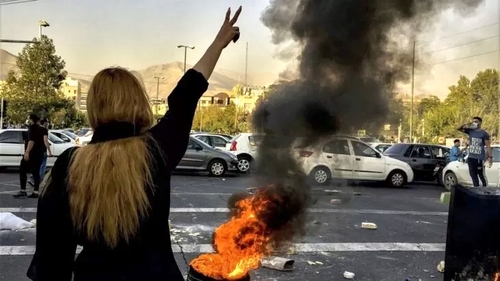Tommaso Alessandro De Filippo: Does the current protest movement in Iran differ in fundamental ways from prior ones?
Daniel Pipes: Yes, it does. No other protest since 1979 has continued for so long or been so widely supported. It also has key constituencies – Kurds and women – that add to its impact.
 Women are a key part of the revolt in Iran. |
TADF: Does the Iranian regime still enjoy a solid position of power or might it collapse?
DP: The regime will likely survive. A counter-revolution needs leadership, which this one lacks. That many of the regime's top leaders helped to overthrow the shah means they have first-hand insights into suppressing their opponents.
TADF: Do you agree with the Biden administration's approach to Iran or should it support the anti-regime protests more?
DP: It should do more. At least Biden has improved somewhat on Obama's response in 2009, when the president, in an effort to reach a nuclear deal with Tehran, basically said nothing in support of the protests. But Biden's response is feeble. Now is the moment to declare that the U.S. government seeks a change of regime in Iran and that it will help those working toward such a change.
TADF: Will the Iranian nuclear buildup lead to a military intervention by either Israel or the United States?
DP: I cannot imagine a Democrat attacking Iran's nuclear infrastructure; a Republican, possibly would do so. If not, Israel is likely to attack it.
TADF: Are NATO countries supporting Ukraine sufficiently? If not, what more can they do?
DP: NATO countries (with the exception of Hungary and Türkiye) have been superb in terms of adopting a unified stance, taking in refugees, freezing Russian assets, cutting off commercial ties, reducing energy dependence, funding Ukrainian government operations, and providing an arsenal. But they have been too fearful of providing Kyiv with the tools, such as tanks and fighter jets, to push the Russian forces out of their country.
